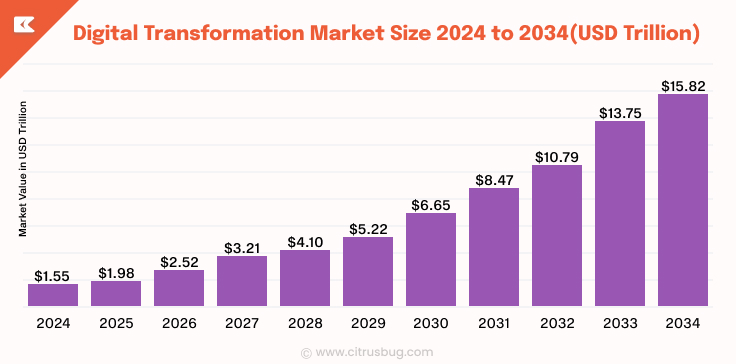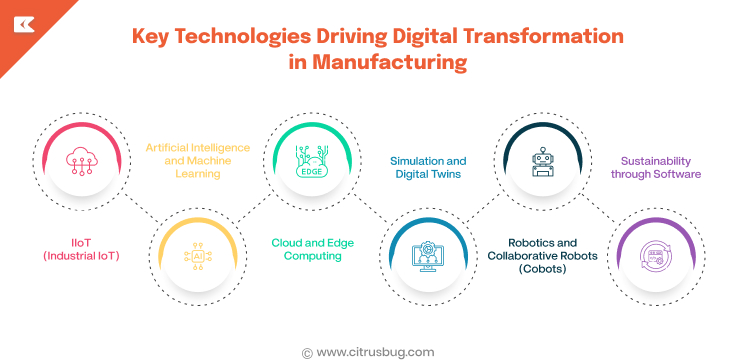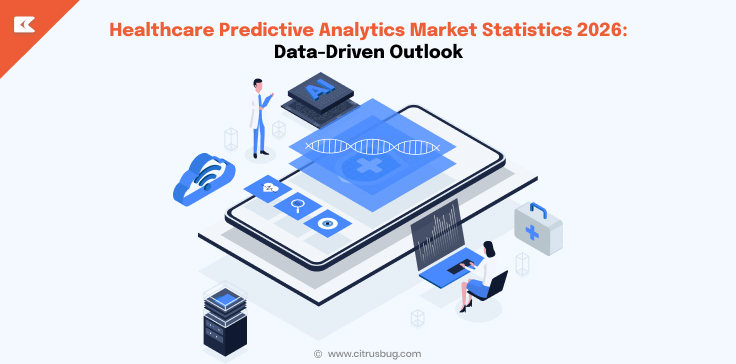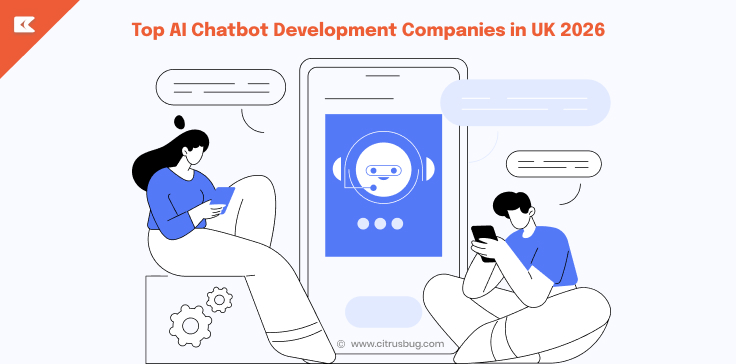Digital Transformation in Manufacturing in 2026: Benefits & Examples
- August 27, 2025
-
1161 Views
- by Ishan Vyas
Table of Contents
- What is Digital Transformation in Manufacturing?
- Why Digital Transformation Matters for the Manufacturing Industry in 2026
- Benefits of Digital Transformation in Manufacturing in 2026
- Key Technologies Driving Digital Transformation in Manufacturing
- Focus Areas for Digital Transformation in Industrial Manufacturing
- Real-World Digital Transformation Examples in Manufacturing
- Challenges of Digital Transformation in Manufacturing
- Why Choose Citrusbug Technolabs for AI Manufacturing Software Development?
- Future of Digital Transformation in Manufacturing Beyond 2026
- Conclusion
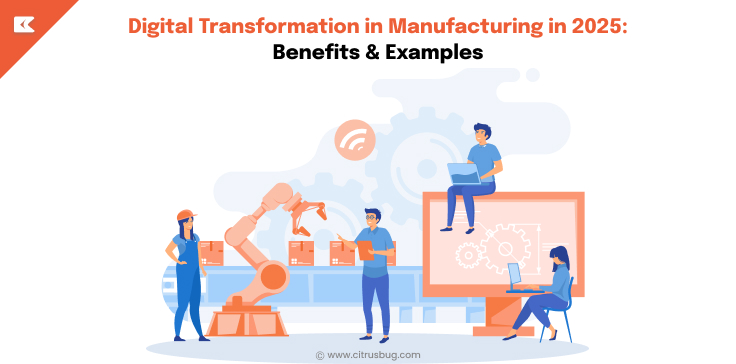
The transformation of the manufacturing industry might be the most obvious change that has occurred in the recent past. Machines are no longer completing tasks, but they learn, predict and make faster decisions than ever teams could. And this is the truth of digital transformation in manufacturing in 2026.
The question is no longer whether to use new technologies, but how fast you can implement them in order to remain competitive. Manufacturers that have adopted this change are experiencing less production delays, enhanced supply chain resilience and actual reduction in costs. Those that wait? They are at risk of losing it in an industry where agility is the new norm.
This guide will explain what exactly digital transformation in manufacturing looks like, the benefits it brings, the technologies driving the change, and practical examples you can use to transform your own business.
What is Digital Transformation in Manufacturing?
Digital transformation in manufacturing is the process of moving from traditional, manual-based production to automated and connected manufacturing supported by data and advanced technologies. It is not simply about upgrading machines or digitizing paperwork. It is the creation of a more intelligent ecosystem, where people, processes, and technology operate together harmoniously.
Under the digital transformation in manufacturing industry, data turns into the basis of any decision. Sensors give real-time data, artificial intelligence forecasts the maintenance before it happens, and linked supply chains respond immediately to changes in the market. The outcome is a quicker production, a decrease in the number of mistakes, and agility.
To start this journey, many manufacturers find solutions such as AI automation in business or machine learning models that maximize inventory, quality control, and logistics. The final aim is to develop an efficient, resilient, and competitive environment for rapidly evolving markets.
Why Digital Transformation Matters for the Manufacturing Industry in 2026
In 2026, manufacturing is no longer about whether to adopt digital solutions but how quickly companies can implement them. 98% of manufacturers are digitally transforming, compared to 78% in 2019.
There are rising investments in technologies, which represent 30% of operating budgets, with the highest returns on investments reported in cloud, generative AI, and 5G. Worldwide, the digital transformation market value was estimated to reach $1.07 trillion in 2024 and will later surge up to $15.82 trillion in 2034, thus making it a necessary move to remain competitive.
Key reasons why digital transformation matters today:
- Operational Efficiency: AI, IoT sensors and real-time data are being used to reduce downtime and cut waste.
- Profitability Gains: More than half of manufacturers indicate profitability successes with digital activity leading to real ROI.
- Supply Chain Resilience: inked networks bring visibility and quicker reaction to disruptions.
- Workforce Empowerment: Digital technologies help employees to be set free from routine activities and make decisions based on real data.
- Manufacturing trends: Generative AI, digital twins, and predictive analytics are transforming factory design, monitoring, and optimization.
- Sustainability: Utilizing the energy efficiently and minimizing waste of resources will contribute to global green ends.
Digitalisation in manufacturing is about creating a business that is resilient, agile, and future-proof, that succeeds in a rapidly changing market. Businesses that have adopted it in the present day are the ones that will lead the industry in the future, whereas those that hold back may lose out.
Benefits of Digital Transformation in Manufacturing in 2026
The effects of digital transformation in manufacturing industry are strong in production, supply chains, and decision-making. It is about automating processes, enhancing their efficiency, and making them more efficient, safer, and competitive in 2026.
Efficiency and Productivity
IoT predictive maintenance can be used to minimize unpredictable downtimes by 70% and maintenance expenditures by 30%. This enables teams to work on more value-adding tasks rather than spend time troubleshooting.
Smarter Supply Chains
New digital tools enable better management of the supply chain and when manufacturers apply IoT in inventory tracking, it provides real-time visibility and enhanced responsiveness.
AI-Driven Returns
More industrial manufacturers are leveraging generative AI and increasingly more are planning to increase investment in AI and machine learning. They are tools that streamline the processes, minimize errors and improve the quality of products.
Higher ROI from Digital Investments
Companies are generating more profitability on their digital investments, demonstrating that manufacturing digital transformation pays off with quantifiable financial gains.
Manufacturing data as an Asset
Manufacturing data is growing at an unprecedented rate by offering cost-effective predictive maintenance, inventory management, and process optimization. When integrated with enterprise systems such as SAP maintenance, this data becomes even more valuable, helping manufacturers track equipment health, schedule repairs proactively, and minimize downtime. The effective use of this data fuels operational excellence and innovative processes.
Beyond machines and automation, digital transformation also empowers employees by reducing repetitive tasks and enabling upskilling opportunities. Customers benefit from faster delivery, better product customization, and improved service.
Key Technologies Driving Digital Transformation in Manufacturing
Digitalization in manufacturing relies on a variety of technologies that turn factories into faster, smarter and more connected machines. There is a different role for each technology to play in the simplification processes, error reduction, and productivity enhancement.
1. IIoT (Industrial IoT)
Edge computing, real-time insights, and sensors are the keys to predictive maintenance and operational insight. The IIoT allows manufacturers to predict problems before they interfere with production and keep track of the performance of their equipment.
2. Artificial Intelligence and Machine Learning
AI and ML can be used in predictive maintenance and demand forecasting, process optimization, and quality control. These are some of the AI trends that have become significant in factories today, as they allow the machine team to make decisions using data faster and precisely.
3. Cloud and Edge Computing
Cloud and edge computing enable scalable analytics with immediate access to critical operating data. By integrating all the elements of the production line, manufacturers are able to make quicker, more intelligent decisions, whilst still retaining uncompromised control over the complicated processes.
4. Simulation and Digital Twins
Digital replica modeling of the equipment and processes also allows manufacturers to test scenarios and workflow improvement and reduce risk by first implementing changes virtually through simulation before doing so on the factory floor, leading to greater planning and operational efficiencies.
5. Robotics and Collaborative Robots (Cobots)
Automation technology, especially robotics, makes processes more accurate and pliable, which means teams can work on more valuable tasks and machines can perform repetitive or potentially dangerous tasks, improving overall productivity and safety.
6. Sustainability through Software
Smart digital solutions enable factory operators to monitor energy consumption, minimize wastage, and convert into carbon-neutral facilities in the long term with consideration to sustainability and corporate responsibility agendas.
When it comes to manufacturing digital transformation, integrating those technologies is the most important. In businesses interested in AI-powered solutions, collaboration with an AI software development agency can streamline the process and help make technologies most effective.
Focus Areas for Digital Transformation in Industrial Manufacturing
Digital transformation in manufacturing is about improving efficiency, agility, and competitiveness. Investing in the right area helps companies maximize their investments.
Smart Factories
Connected production lines create real-time visibility, operational transparency, quicker decisions in all processes, and minimize manual errors and enhance coordination.
Predictive Maintenance
AI forecasts possible equipment breakdowns before they can happen, leading to downtime reduction, cost reduction in repairs and even prolonged machinery life.
Digitization of the supply chain
Real-time monitoring and analysis make the supply chain more robust, transparent, and dynamic, and allow it to respond to fluctuations in the market and fluctuating demand much faster.
Upskilling the Teams
Training employees about automation, analytics, and digital tools guarantees a higher level of adoption, improved efficiency, and communication throughout departments.
Customer-Driven Value
Personalized production, workflows, and traceability allow manufacturers to satisfy emerging customer needs and increase satisfaction and loyalty.
These areas are critical to the success of digital transformation in manufacturing because they help companies remain competitive and future-proof.
Real-World Digital Transformation Examples in Manufacturing
The digitalization of the manufacturing industry is transforming industries and allowing companies to innovate, achieve efficiency, and remain competitive. Here are some real-life examples:
-
Automotive Industry
In this sector, major automakers are applying digital twins to the design process simulation, including the process of production. This will minimize the design mistakes, development cycles and enhance teamwork among engineering departments, and also boost the efficiency of the production.
-
Electronics Manufacturing
Predictive quality control using AI is occurring at electronics manufacturing factories. A data-driven approach to manufacturing digital transformation can be achieved by processing production data in real time and identifying defects and minimizing wasted production in order to ensure quality products.
-
Aerospace
Aerospace manufacturers are finding the use of additive manufacturing to enable them to make lighter components, but also more efficient. Such digitalization lowers the cost of materials, accelerates prototyping, and ensures better fuel efficiency, showing how digital transformation in manufacturing sector can help achieve innovation and sustainability.
-
FMCG Sector
The fast-moving consumer goods companies are deploying the IoT-enabled supply chains to monitor inventory, track shipments and respond immediately to shifting demand. This helps in making things more transparent, minimizes all stockout situations and makes the products availed to the customers quicker and with more reliability.
-
Heavy Machinery
Predictive maintenance systems use constant tracking of machines to predict the inclination to failure before it occurs. This reduces downtimes, adds durability to machinery, and adds effectiveness to operations, which proves that digital transformation is practical in the manufacturing sector.
Global giants and startups in various industries are leading the way into the digital manufacturing realm, which shows that establishing digital manufacturing can be implemented on a large scale. A partnership with a custom software development firm can assist businesses in an effective rollout of AI-enabled solutions.
Challenges of Digital Transformation in Manufacturing
There are various challenges associated with the implementation of digital transformation in the manufacturing sector that businesses should negotiate to attain success.
Data Preparation
Low-quality, siloed, or inconsistent data can make adoption slow. Over 60% of manufacturers lack AI-ready data pipelines, and AI development services are the best chance to improve data governance and system modernization.
Fragmented Adoption
Most manufacturers are adopting digital tools in a piecemeal fashion instead of engaging in strategic adoption, which limits the future benefits of overall digital maturity.
Manual-based legacy
A large number of firms still use manual-based systems of configuration and quotation, which makes it tricky to integrate with the newer digital systems.
Third-Party Dependence
Outsourcing of key functions, including cybersecurity, data management, and automation, may create dependency risk.
Proactively solving these issues is important to harness the full potential of digital transformation trends in production and achieve easier and scalable realization.
Why Choose Citrusbug Technolabs for AI Manufacturing Software Development?
Citrusbug Technolabs offers expert AI development services to empower manufacturing companies to embark on a real digital transformation of manufacturing. We offer solutions that integrate superior technology with expertise in the industry to enhance efficiency, flexibility and innovation in operations.
- Industry Expertise: We have expertise in the industry-specific requirements of the manufacturing industry and provide solutions related to workflows and operational requirements.
- Custom Software Development: Our software development business builds scalable and high-performance applications that integrate with your existing systems to improve productivity and operational efficiency within every department or area of focus.
- AI and Automation Knowledge: Our manufacturing app development services can help manufacturers integrate predictive maintenance to optimize their supply chains and make informed decisions off valuable data.
- End-to-End Support: We take you through the whole process, including planning and strategy, to implementation and optimization to yield results and a continuous improvement in the process.
- ROI focused solutions: We develop solutions that maximize productivity, minimize operations costs and decision-making processes that drive ROI within your organization.
- Future-Ready Solutions: We work with you to adopt technologies that will keep your operations competitive in the present and open to adaptation in the future to support your long-term growth and innovation.
By partnering with Citrusbug Technolabs, you are working with a team that is committed to delivering actual results and to ensuring that your manufacturing company succeeds by means of technology-driven innovation.
Future of Digital Transformation in Manufacturing Beyond 2026
The future of digital manufacturing transformation is shifting to more intelligent, autonomous, and highly connected factories. Manufacturers will leverage AI, machine learning, and advanced analytics to make real-time decisions and optimize activities throughout the supply chain as technologies change.
Generative AI will most likely be critical in design, process optimisation, and predictive modelling. Firms that invest in understanding generative AI will have a competitive advantage to rapidly prototype their products, lower costs and make better products overall.
Other trends shaping the future include:
- Hyper-Automation: The integration of AI, robots, and intelligent software to automate production and minimize manual intervention.
- Sustainability and Green Manufacturing: Digital tools will be used to trace emissions, optimize energy usage, and meet environmental compliance-related objectives.
- Advanced Analytics and Machine Learning: Insights derived from artificial intelligence will make maintenance and inventory management smarter and improve performance.
Manufacturers that adopt these innovations will be at the forefront in terms of agility, efficiency and customer satisfaction. To remain competitive with the digital transformation in manufacturing industry, adopting AI-powered solutions, flexible software systems, and data-driven approaches that can future-proof operations is the way forward.
Conclusion
Digital manufacturing is no longer optional. The shift to smart factories, artificial intelligence-based insights, predictive maintenance, and connected supply chains can make manufacturers in 2026 and beyond more efficient, agile, and competitive.
As an expert manufacturing software development agency, Citrusbug Technolabs assists companies in implementing the initiatives successfully. With strategic leadership and sophisticated technology, manufacturers can innovate, streamline their activities, and realize long-term growth.





 SaaS Development
SaaS Development Web Application Development
Web Application Development Mobile Application Development
Mobile Application Development Custom Software Development
Custom Software Development Cloud Development
Cloud Development DevOps Development
DevOps Development MVP Development
MVP Development Digital Product Development
Digital Product Development Hire Chatbot Developers
Hire Chatbot Developers Hire Python Developers
Hire Python Developers Hire Django Developers
Hire Django Developers Hire ReactJS Developers
Hire ReactJS Developers Hire AngularJS Developers
Hire AngularJS Developers Hire VueJS Developers
Hire VueJS Developers Hire Full Stack Developers
Hire Full Stack Developers Hire Back End Developers
Hire Back End Developers Hire Front End Developers
Hire Front End Developers AI Healthcare Software Development & Consulting
AI Healthcare Software Development & Consulting Healthcare App Development
Healthcare App Development EHR Software Development
EHR Software Development Healthcare AI Chatbot Development
Healthcare AI Chatbot Development Telemedicine App Development Company
Telemedicine App Development Company Medical Billing Software Development
Medical Billing Software Development Fitness App Development
Fitness App Development RPM Software Development
RPM Software Development Medicine Delivery App Development
Medicine Delivery App Development Medical Device Software Development
Medical Device Software Development Patient Engagement Software Solutions
Patient Engagement Software Solutions Mental Health App Development
Mental Health App Development Healthcare IT Consulting
Healthcare IT Consulting Healthcare CRM Software Development
Healthcare CRM Software Development Healthcare IT Managed Services
Healthcare IT Managed Services Healthcare Software Testing services
Healthcare Software Testing services Medical Practice Management Software
Medical Practice Management Software Outsourcing Healthcare IT Services
Outsourcing Healthcare IT Services IoT Solutions for Healthcare
IoT Solutions for Healthcare Medical Image Analysis Software Development Services
Medical Image Analysis Software Development Services Lending Software Development Services
Lending Software Development Services Payment Gateway Software Development
Payment Gateway Software Development Accounting Software Development
Accounting Software Development AI-Driven Banking App Development
AI-Driven Banking App Development Insurance Software Development
Insurance Software Development Finance Software Development
Finance Software Development Loan Management Software Development
Loan Management Software Development Decentralized Finance Development Services
Decentralized Finance Development Services eWallet App Development
eWallet App Development Payment App Development
Payment App Development Money Transfer App Development
Money Transfer App Development Mortgage Software Development
Mortgage Software Development Insurance Fraud Detection Software Development
Insurance Fraud Detection Software Development Wealth Management Software Development
Wealth Management Software Development Cryptocurrency Exchange Platform Development
Cryptocurrency Exchange Platform Development Neobank App Development
Neobank App Development Stock Trading App Development
Stock Trading App Development AML software Development
AML software Development Web3 Wallet Development
Web3 Wallet Development Robo-Advisor App Development
Robo-Advisor App Development Supply Chain Management Software Development
Supply Chain Management Software Development Fleet Management Software Development
Fleet Management Software Development Warehouse Management Software Development
Warehouse Management Software Development LMS Development
LMS Development Education App Development
Education App Development Inventory Management Software Development
Inventory Management Software Development Property Management Software Development
Property Management Software Development Real Estate CRM Software Development
Real Estate CRM Software Development Real Estate Document Management Software
Real Estate Document Management Software Construction App Development
Construction App Development Construction ERP Software Development
Construction ERP Software Development





